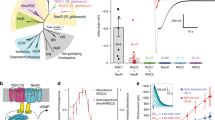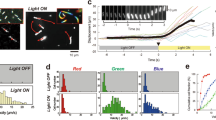Abstract
PHOTOREPAIR in Neurospora conidia has been shown to be an enzyme process which operates on both lethal and mutagenic damage induced by ultra-violet light1,2. When irradiated conidia are incubated in the dark they lose their ability to respond to subsequent exposure to photorepairing light. This loss is dependent on temperature and can be much reduced at temperatures approaching 0° C. It occurs as well on the surface of growth medium as in water. The main features of the phenomenon are shown in Fig. 1. The results here refer to survival, but essentially the same results were obtained for adenine reversion induced by ultra-violet light (Kilbey, unpublished experiments).
This is a preview of subscription content, access via your institution
Access options
Subscribe to this journal
Receive 51 print issues and online access
$199.00 per year
only $3.90 per issue
Buy this article
- Purchase on Springer Link
- Instant access to full article PDF
Prices may be subject to local taxes which are calculated during checkout
Similar content being viewed by others
References
Kilbey, B. J., and de Serres, F. J., Mutation Res., 4, 21 (1967).
Terry, C. E., Kilbey, B. J., and, Branch-Howe, jun., H., Radiat. Res., 30, 739 (1967).
Author information
Authors and Affiliations
Rights and permissions
About this article
Cite this article
KILBEY, B. Loss of Photorepair Ability in Conidia of Neurospora crassa. Nature 214, 1016–1017 (1967). https://doi.org/10.1038/2141016a0
Received:
Revised:
Published:
Issue Date:
DOI: https://doi.org/10.1038/2141016a0
This article is cited by
-
Analysis of a case of mutagen specificity in Neurospora crassa
Molecular and General Genetics MGG (1970)
Comments
By submitting a comment you agree to abide by our Terms and Community Guidelines. If you find something abusive or that does not comply with our terms or guidelines please flag it as inappropriate.



